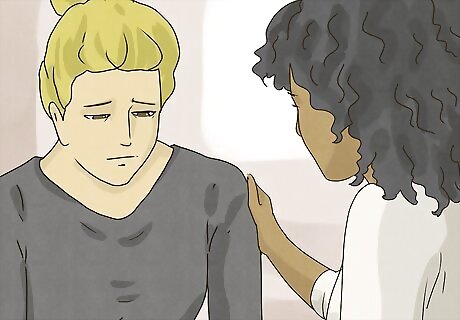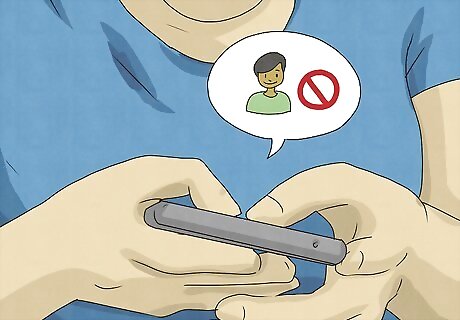
views
X
Trustworthy Source
Mayo Clinic
Educational website from one of the world's leading hospitals
Go to source
Signs of Malignant Narcissistic Tendencies

Someone with malignant narcissistic tendencies may have an inflated ego. If someone displays narcissistic qualities, they likely have a deep-seated sense of inferiority—which they may compensate for with an inflated sense of self-worth. Because narcissism can influence people to focus on themselves and their needs, they may act as if they’re the most important person in the room and even expect special treatment from others. While many people consider the feelings of others when fostering relationships, people with narcissistic tendencies may seem to care way more about how they feel than other people.

People with narcissistic traits may struggle to feel empathy or compassion. Malignant narcissistic traits in particular often involve being overtly apathetic or even aggressive at times. Someone with malignant narcissistic traits may be verbally cruel towards others, even if not physically violent. Many narcissistic people rely on gaslighting, a technique in which they convince someone that their perception of reality isn’t accurate, to get what they want or make themselves look better.

People with malignant narcissistic traits may exhibit symptoms of paranoia. There are other kinds of narcissism, but none of them (outside of the malignant narcissist) tend toward paranoia. Someone with traits of a malignant narcissist may think people are scheming against them, or presume there’s a conspiracy when things don’t go their way. The other kinds of narcissism include: Overt. Overt narcissists are outgoing but may be extremely arrogant and entitled. Covert. These narcissists have a poor self-image, and don’t outwardly act like they’re great. Antagonistic. Antagonistic narcissists tend to be arrogant and prone to argue with others. Communal. These narcissists often find fulfillment from external validation and may use moral superiority and concern for social issues to get praise from others. Keep in mind, however, that you cannot diagnose someone yourself, even if they seem to really fit the description of a certain type of narcissist. Only a licensed therapist can diagnose NPD.
How to Expose Their Behavior

Draw attention to their contradictions. People with narcissistic tendencies may share incompatible ideas and statements as it suits them. Whenever you spot an inconsistency, nicely comment on it in a roundabout or good-natured way without being combative. The person may dig in deeper, or they might walk it back and acknowledge they’re lying. For example: Them: “I’m so tired of Melissa. She’s always complaining about everything.”You: “That’s kind of funny, you’re complaining right now.” Them: “I can’t believe there’s a $10 cover for the party.”You: “Oh, I thought you were crushing it at work! You just got a raise right? It shouldn’t be a big deal, right?” Them: “I can’t stand sloppy people.”You: “Nobody’s perfect all the time. Haven’t you ever made a mess or accidentally worn a stained shirt to work?”

Catch them in a lie. If this person is prone to fibbing to make themselves look better or to get what they want, respectfully but firmly acknowledge when something they say is untrue. This isn’t about taking pleasure in seeing them squirm, but making it clear you won’t tolerate dishonesty. For example, if they give you the wrong address to a party and you arrive late, they may blame you for being late in order to make themselves feel better about giving you the wrong directions. Instead of fighting them or calmly enduring their lies, firmly but respectfully say, “That’s not true. I would be on time if you had given me the right address.”

Validate people they put down. If this person has a tendency to put others down to make themselves feel better, stand up for the people they pick on. This might help the person realize they can’t get away with picking on others, as well as show other folks that the person might not be as trustworthy as they pretend to be. This is especially important if this person is an influential member of your social circle, since building others up will undermine their authority. For example, if they mock a mutual friend for doing poorly on a test, you might tell your mutual friend, “I wouldn’t sweat it. Everyone did poorly on that exam—including me.” If this person puts someone down for the way they look, you could tell the target of their mockery, “Oh, don’t listen to them. I really like your new haircut. I think it suits your face.”

Avoid letting them have control all of the time. People with narcissistic tendencies tend to like to be in control, so inviting them out of their comfort zone may destabilize them a bit. The more control you exercise, the more likely they will be to surrender control over others. If they always invite people to their place, for instance, host a party at your home for once. If they always suggest going to the corner bar for cheap eats, get everyone hyped about fine dining this weekend. This goes for little stuff, too! If they hate country music, maybe you throw on some Willie Nelson next time you’re in the car together. If they hate the cold, suggest skiing for your next family reunion. This doesn’t mean intentionally trying to make sure they have a bad time, but asserting your right to take charge of social situations now and then, rather than letting this person control everything you do together.

Stand up for yourself when they cross a line. If they say or do something outwardly rude or cruel, don’t let them get away with it—especially in front of others. Calmly call them out and explain why they’re not being fair. Don’t mince your words, but stay cool. For example, if they try to belittle somebody for making a mistake, you might say, “Everyone makes mistakes. It’s not your place to remind them.”

Focus on your own growth and well-being. “The best revenge is living well,” as the saying goes. Stand up for yourself and for others when necessary, but try not to worry too much about this person’s behavior. Focus on yourself, grow your relationships with others, and find your inner peace. While it can be hard to deal with a friend or family member with narcissistic traits, remember that you can’t change their behavior—and you’re not responsible for what they do.
What to Expect Afterward

This person may lash out at you, so stay cool to maintain control. People with narcissistic tendencies often resist criticism and may react negatively if you stand up to them. If they shout or lash out at you in a totally unwarranted way, let them. Trust that their behavior will speak for itself. For example, if they snap at you and shout, you might say calmly, “Oh, I’m sorry. I didn’t mean to upset you so badly. Are you okay?”

They may try to turn others against you. When confronted, a person with narcissistic tendencies may feel victimized and may try to make you look bad. They may lie about you, gossip, or spread rumors to change the social tides against you. This can be overwhelming and discouraging, but try not to lose hope: trust that other people will ultimately see through their dishonest behavior, just like you can. Your best option is to usually dismiss any false accusations without giving them too much attention. It’s possible they want you to have a big reaction, so don’t give them one.
How to Deal With Their Behavior

Set clear and concrete boundaries with them. Boundary-setting is key when it comes to dealing with a person with narcissistic traits and keeping their behavior in check. Determine what you will and will not put up with, and communicate your boundaries to them clearly. This is how you set a boundary: Draw the line. You might say, “You cannot put me down in front of other people.” Explain the consequence. You could tell them, “If you do put me down, I’m not going to invite you over anymore.” Refuse to negotiate. They may try to argue or fight back, so just say, “It’s not up for discussion. This is not negotiable.” Enforce the boundary. If they cross a line and you let it slide, they may think you’re not serious about your boundaries, so be sure to follow through on what you say you’ll do.

Enlist the help of friends and family to build a coalition. People with narcissistic traits often crave praise and attention from others, so pulling other people into your corner can go a long way toward keeping this person from trampling over everybody. If you have mutual friends who you know are also fed up with this person’s behavior, pull those friends aside and tell them you’re going to stand up to them. This way, you’ll have backup. You might tell a close friend, “Look, Jimmy has been really rude to us recently. It bothers me, and I know it bothers you. I’m going to call him out next time he does this, I just wanted to give you a heads up to see where you’re at.” This isn’t about ganging up on someone, but about seeking support. It’ll help you feel less alone, and it may help the person better understand the full effects of their behavior.
Healing from Narcissistic Behavior

Go no-contact to create some space to heal. In some cases, the best solution is to distance yourself from a person with narcissistic traits. Block their number, remove them from your social media, and don’t interact with them. This will give you space to heal. Try not to blame yourself for cutting them off: you’ll be better off in the long run. This can be especially tough if the person is a close family member, you have tons of mutual friends, or you work with them. If you can’t cut them off entirely, at least minimize how much time you spend interacting with them.

Reach out for professional help if you’ve suffered from abuse. Abuse of any sort can take a serious emotional toll, and seeking professional help can dramatically improve the recovery process. Find a psychologist, therapist, or counselor near you and reach out to them. They’ll give you the tools and space you need to begin healing. You can find a qualified, affordable therapist near you by searching online at BetterHelp.


















Comments
0 comment